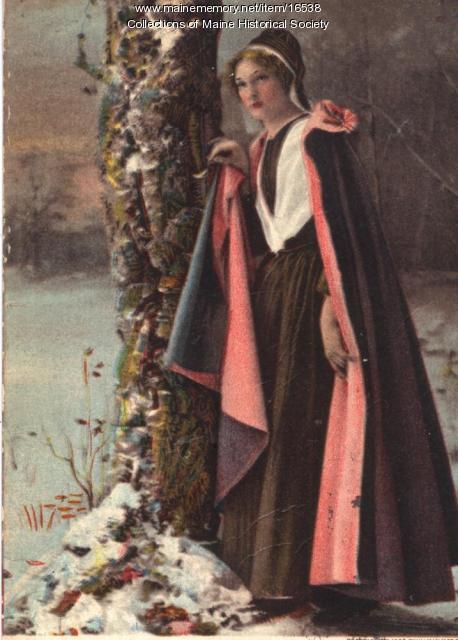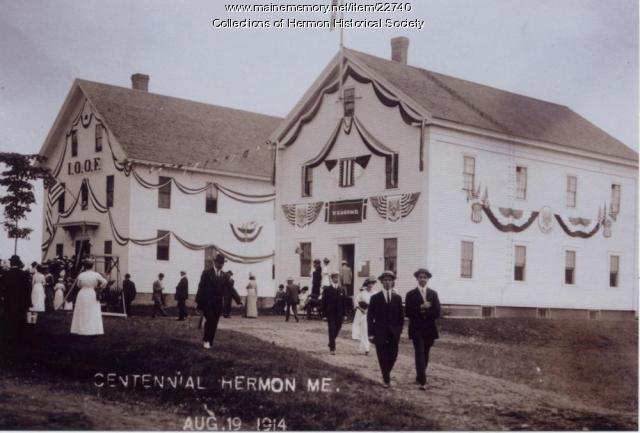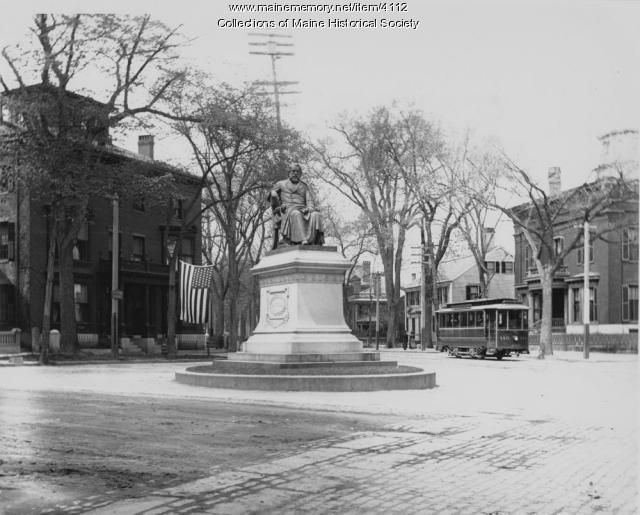Keywords: Universal
- Historical Items (1203)
- Tax Records (19)
- Architecture & Landscape (41)
- Online Exhibits (85)
- Site Pages (142)
- My Maine Stories (46)
- Lesson Plans (6)
Lesson Plans
Your results include these lesson plans. Your results include these lesson plans.
Lesson Plan
Longfellow Studies: Integration of Longfellow's Poetry into American Studies
Grade Level: 9-12
Content Area: English Language Arts, Social Studies
We explored Longfellow's ability to express universality of human emotions/experiences while also looking at the patterns he articulated in history that are applicable well beyond his era. We attempted to link a number of Longfellow's poems with different eras in U.S. History and accompanying literature, so that the poems complemented the various units. With each poem, we want to explore the question: What is American identity?
Lesson Plan
Longfellow Studies: The Acadian Diaspora - Reading "Evangeline" as a Feminist and Metaphoric Text
Grade Level: 6-8, 9-12
Content Area: English Language Arts, Social Studies
Evangeline, Longfellow's heroine, has long been read as a search for Evangeline's long-lost love, Gabrielle--separated by the British in 1755 at the time of the Grand Derangement, the Acadian Diaspora. The couple comes to find each other late in life and the story ends. Or does it?
Why does Longfellow choose to tell the story of this cultural group with a woman as the protagonist who is a member of a minority culture the Acadians? Does this say something about Longfellow's ability for understanding the misfortunes of others?
Who is Evangeline searching for? Is it Gabriel, or her long-lost land of Acadia? Does the couple represent that which is lost to them, the land of their birth and rebirth? These are some of the thoughts and ideas which permeate Longfellow's text, Evangeline, beyond the tale of two lovers lost to one another. As the documentary, Evangeline's Quest (see below) states: "The Acadians, the only people to celebrate their defeat." They, as a cultural group, are found in the poem and their story is told.
Lesson Plan
Building Community/Community Buildings
Grade Level: 6-8
Content Area: Social Studies
Where do people gather? What defines a community? What buildings allow people to congregate to celebrate, learn, debate, vote, and take part in all manner of community activities? Students will evaluate images and primary documents from throughout Maine’s history, and look at some of Maine’s earliest gathering spaces and organizations, and how many communities established themselves around certain types of buildings. Students will make connections between the community buildings of the past and the ways we express identity and create communities today.
Lesson Plan
Grade Level: 3-5
Content Area: Health Education & Physical Education, Social Studies
This lesson plan will introduce students to myriad communities in Maine, past and present, through the universal lens of sports and group activities. Students will explore and understand the history of many of Maine’s recreational pastimes, what makes Maine the ideal location for some outdoor sports, and how communities have come together through team activities throughout Maine’s history.
Lesson Plan
Grade Level: 9-12
Content Area: Social Studies
Maine's quest for statehood began in the years immediately following the American Revolution. Though the state of Massachusetts consented to the separation in 1819 and Maine would ultimately achieve statehood in 1820, Maine’s split from Massachusetts was not without controversy and was not universally supported by people living in Maine. Using primary sources, students will explore the arguments for and against Maine statehood. Students will gather evidence and arguments to debate the statement: It is in the best interests of the people of Maine for Maine to become its own state.
Lesson Plan
Longfellow Studies: An American Studies Approach to Henry Wadsworth Longfellow
Grade Level: 6-8, 9-12
Content Area: English Language Arts, Social Studies
Henry Wadsworth Longfellow was truly a man of his time and of his nation; this native of Portland, Maine and graduate of Bowdoin College in Brunswick, Maine became an American icon. Lines from his poems intersperse our daily speech and the characters of his long narrative poems have become part of American myth. Longfellow's fame was international; scholars, politicians, heads-of-state and everyday people read and memorized his poems. Our goal is to show that just as Longfellow reacted to and participated in his times, so his poetry participated in shaping and defining American culture and literature.
The following unit plan introduces and demonstrates an American Studies approach to the life and work of Longfellow. Because the collaborative work that forms the basis for this unit was partially responsible for leading the two of us to complete the American & New England Studies Masters program at University of Southern Maine, we returned there for a working definition of "American Studies approach" as it applies to the grade level classroom. Joe Conforti, who was director at the time we both went through the program, offered some useful clarifying comments and explanation. He reminded us that such a focus provides a holistic approach to the life and work of an author. It sets a work of literature in a broad cultural and historical context as well as in the context of the poet's life. The aim of an American Studies approach is to "broaden the context of a work to illuminate the American past" (Conforti) for your students.
We have found this approach to have multiple benefits at the classroom and research level. It brings the poems and the poet alive for students and connects with other curricular work, especially social studies. When linked with a Maine history unit, it helps to place Portland and Maine in an historical and cultural context. It also provides an inviting atmosphere for the in-depth study of the mechanics of Longfellow's poetry.
What follows is a set of lesson plans that form a unit of study. The biographical "anchor" that we have used for this unit is an out-of-print biography An American Bard: The story of Henry Wadsworth Longfellow, by Ruth Langland Holberg, Thomas Y. Crowell & Company, c1963. Permission has been requested to make this work available as a downloadable file off this web page, but in the meantime, used copies are readily and cheaply available from various vendors. The poem we have chosen to demonstrate our approach is "Paul Revere's Ride." The worksheets were developed by Judy Donahue, the explanatory essays researched and written by the two of us, and our sources are cited below. We have also included a list of helpful links. When possible we have included helpful material in text format, or have supplied site links. Our complete unit includes other Longfellow poems with the same approach, but in the interest of time and space, they are not included. Please feel free to contact us with questions and comments.







